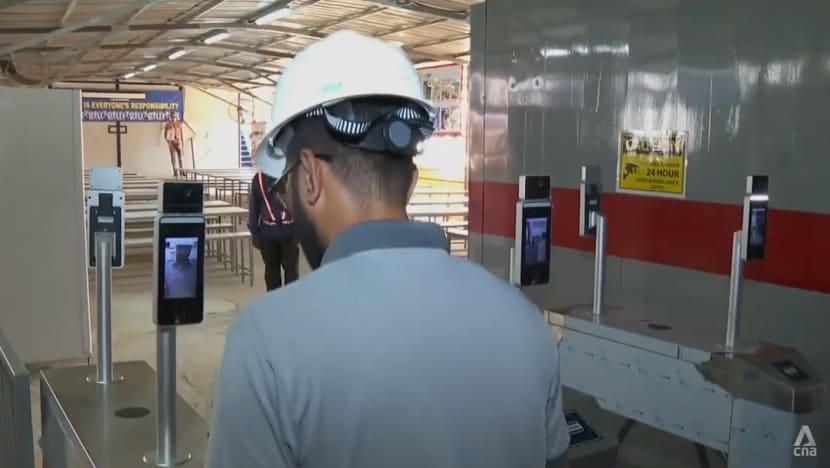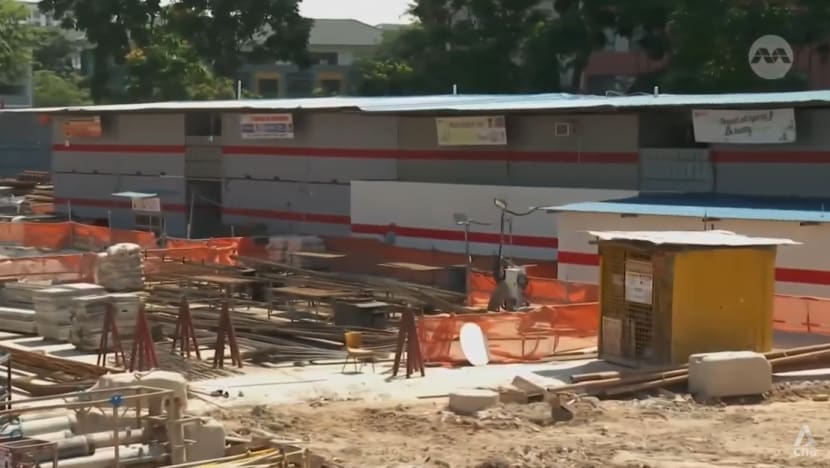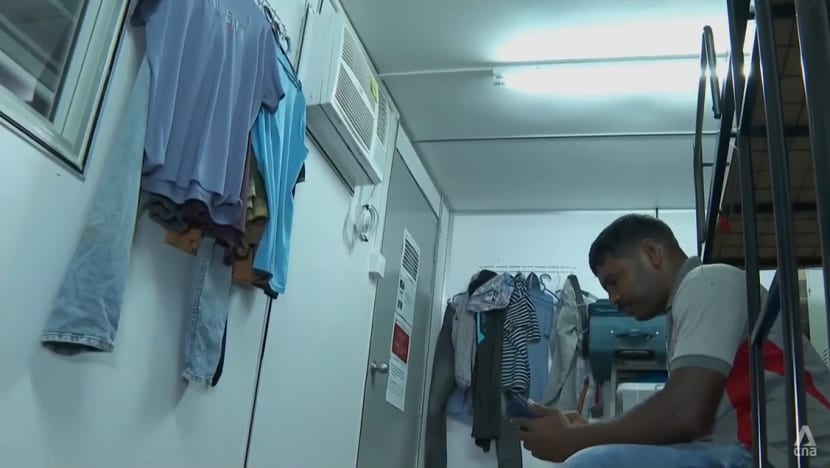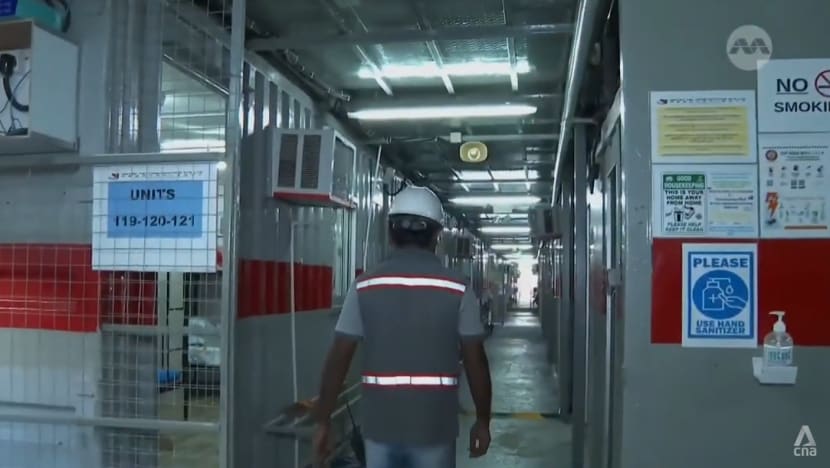Construction firms grapple with workers’ housing as dorm rental rates soar
While larger firms are dealing with accommodation issues by building their own temporary quarters, some smaller players are struggling with finding new housing solutions.

A worker enters through a gantry at a temporary housing facility located at a construction site.
SINGAPORE: Soaring rental rates at dormitories have forced some construction firms to find alternative housing for their workers.
Some larger contractors said they are addressing the lodging shortage with Construction Temporary Quarters (CTQs) – worker housing located within a construction site or parts of buildings still under construction.
However, smaller players said they are struggling with finding solutions. Some are sub-renting from their counterparts while others are looking at substitute living quarters such as condominiums.
ON-SITE TEMPORARY QUARTERS
One business utilising such CTQs is United Tec Construction, which has built accommodation on its construction premises for its employees.
The company said this option offers numerous perks, including proximity, productivity, and workers’ welfare.
“These temporary dorms at job sites are custom-made for your requirements,” said the firm’s founder Allan Tan. “They have many advantages as the workers don't have to wake up so early to commute. Even after work, they have more time to rest. I strongly encourage the industry to adopt this solution.”
Mr Tan said he has observed a 40 per cent spike in commercial dormitory rental since the COVID-19 pandemic, adding the increase is “unrealistic and has a huge impact on construction costs in the whole industry”.
He said his company saves more than S$80,000 (US$58,700) every month housing its workers on-site, instead of commercial dormitories, even after factoring in the costs of building the CTQs. Employees also enjoy amenities such as in-room air-conditioning, gym and free Wi-Fi.

However, the process of having on-site living quarters takes over three months to complete, including seeking approvals and clearance from relevant authorities such as the Ministry of Manpower (MOM) and the National Environment Agency (NEA), he said, adding he hopes the procedure can be shortened to better facilitate housing options for the firms.
FRAMEWORK FOR DORMITORIES
Mr Tan acknowledged that while bigger firms have the advantage of building their own accommodation, smaller construction businesses such as subcontractors working on the same projects cannot afford to do the same.
Most are unable to build their own temporary living quarters as they often do not have permanent projects.
He said that while he was able to support some of his subcontractors by helping to house a number of their workers in his on-site dormitories in the past, recent housing requirements by the authorities mean his hands are tied.

“It's very difficult for us to support them. I would love to, frankly speaking, they are part of the productivity journey and the team in the construction process. But as a result (of the new law), the space required (for living) is bigger and therefore the capacity per job site has been reduced,” said Mr Tan.
As of April this year, the Foreign Employee Dormitories Act (FEDA) – which raises standards and living conditions for more than 1,500 dormitories, mandates minimum space per resident, maximum room occupancy, cleanliness and ventilation, as well as the adequate provision of amenities.
WORSE FOR SMALLER FIRMS
Construction firm OS Builders, which hires about 20 foreign workers, said it was recently forced to relocate its employees after rent at its dormitory skyrocketed without prior warning.
The company said the commercial dormitory, which it has been renting for the past eight years, used to cost S$2,500 for a room for 12 people in 2021. Last year, the price climbed to S$3,500. This year, the owners asked for a rental fee of S$6,600 – more than 2.5 times the amount two years ago.

“This is a huge problem for us. If we have confirmed construction projects and income, then it may offset some of these additional costs. But if we have fewer jobs, then SMEs (small and medium-sized enterprises) like us are in trouble,” said the firm’s director Nge Su Yong.
“On top of accommodation, we still have to pay workers’ salaries and other expenses. We might face a shortage in funds.”
The company found a condominium space for about S$4,000 per month to accommodate six employees. However, the firm is uncertain if the solution is sustainable.
“We don’t have a solution. If we want projects, we need workers. If we hire workers, we have to deal with all these (accommodation) problems and expenses. If we are unable to handle all these overheads, we face the threat of closing down,” Mdm Nge told CNA in Mandarin.
The lack of living quarters within their budget has led OS Builders to delay the arrival of four new foreign workers.
“For many of us SMEs, business has not been smooth as of late due to all these hike in expenses. For example, workers’ wages go up but the projects we get do not give us more revenue. Still, I must still be responsible for my workers and my business, I can’t just give up,” she said.



















